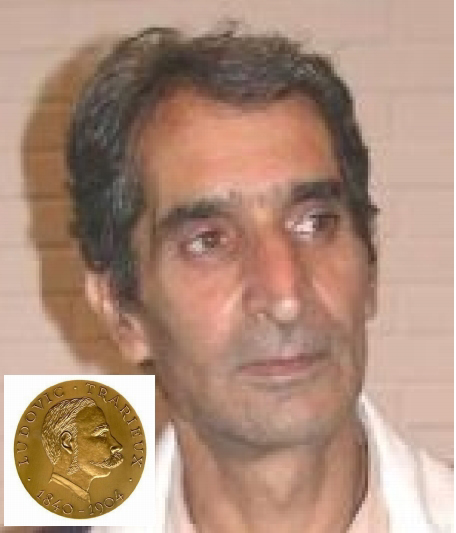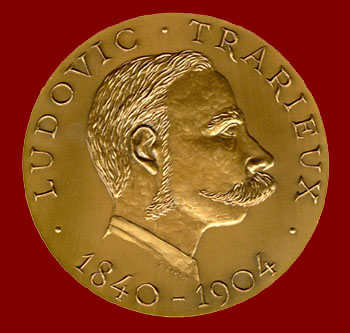Ludovic Trarieux Historical Account The Prize 2000 The Prize 2002 The Prize 2003 The Prize 2004 The Prize 2005 The Prize 2006 The Prize 2007 Livre d'Or
Prix International des droits de l'homme Ludovic-Trarieux
2006
Ludovic-Trarieux International Human
Rights Prize 2006
Premio Internacional de Derechos
Humanos Ludovic Trarieux
2006
Internationalen Ludovic-Trarieux-Menschenrechtspreis 2006
Prêmio Internacional
de Direitos Humanos Ludovic
Trarieux 2006
Premio Internazionale
per i Diritti Umani Ludovic
Trarieux 2006
Ludovic Trarieux
Internationale Mensenrechtenprijs 2006
“The award given by lawyers to a lawyer ”

 Parvez IMROZ
Parvez IMROZ
Ludovic-Trarieux International Human Rights Prize
2006
The European
lawyers members of the Jury
of the "LUDOVIC-TRARIEUX INTERNATIONAL HUMAN RIGHTS PRIZE » meeting in
Brussels Court’s House, on Friday 2 June 2006 awarded the eleventh « Ludovic-Trarieux » Prize, created in 1984 (first prize winner Nelson Mandela then
in jail) and awarded every year to a lawyer, regardless of nationality or Bar, who, by his work, will
have illustrated his activity or his suffering, the defence of human rights, of defence rights, the supremacy of law, the struggle against racism and intolerance in any form and given jointly by the HUMAN RIGHTS INSTITUTES OF THE BAR Of
BORDEAUX, BRUSSELS, PARIS and the EUROPEAN BAR HUMAN RIGHTS INSTITUTE ( IDHAE),
axarded the Prize 2006 to Parvez Imroz, a human rights lawyer and a civil rights activist in Srinagar, the
capital of Jammu and Kashmir, who,
since the end of the eighties, has initiated and led campaigns for human rights in a context of grave
violations, including killings,
tortures and rapes, or forced
"disappearances" with
impunity
Parvez Imroz is founder and President of the
J&K Coalition of Civil Society (JKCCS) that works to build local alliances between Kashmiri civil society groups.
The following
was the list of the Jury
for 2006 : : Bâtonnier Bertrand Favreau, Président, Bâtonnier John Bigwood (Bruxelles), Bâtonnier Henri Ader (Paris), President Woijciech Hermelinski ( National Polish Bar
Council Warsaw), Bâtonnier Manuel Ducasse (Bordeaux),
President Mario Lana (Roma), President
Lucy Winskell (Law Society of England
and Wales - London), Präsident Bernd Haüsler (Rechtsanwaltskammer
Berlin), Bâtonnier Robert De Baerdemaeker (Brussels),
Bâtonnier Georges-Albert Dal (Brussels), Christophe. Pettiti
IDHBP (Paris), Julia Bateman (London), Brigitte Azema
Peyret, (Bordeaux), Hélêne Szuberla, (Bordeaux), Nicole Dehry,
IDHBP (Paris), Isabelle Huet, IDHBP (Paris), Marie-France Guet, IDHBP (Paris),
Reginald de Beco (Brussels), Raymond Blet,
(Bordeaux), Philippe Froin, (Bordeaux), Frédéric Krenc (Brussels, Thierry Bontinck
(Brussels).
.
Background : Previously, on May 17 2006: Amnesty
International has approached the special representative of the UN secretary
general on the denial of passport to the human rights activist Parvez Imroz, who heads the
J&K coalition of Civil Society.
In a statement Imroz,
who is also the patron of the association of parents of disappeared persons,
said he had applied for the renewal of passport in 2004 to the passport
authorities in the state. Since thereafter the authorities have neither
formally denied him the passport nor given reasons for its non- issuance.
The human rights activist's no objection
certificate (NOC) is lying with the CID/ CIK since March 14, 2005 with the result
he was unable to attend the important international human rights conferences
Imroz believes that being
human rights activist the state is unlikely to issue him the passport which
contravenes the Indian constitution and international treaties like ICCPR
(section 12 guarantees Right to Travel outside the country) to which government
of India is signatory. Denial of travel documents deprive him the right to have
unhindered access with the international NGOs and human rights organizations,
which is also violation of the UN declaration on human rights defenders.
Several previous Amnesty documents have
reported threats and other difficulties experienced by Imroz
because of his human rights. In 2002 Amnesty issued a report persecuted for
challenging injustice: human rights defenders in India documenting their
concerns about the treatment of human rights activists. The organization has
asked the government of India on many occasions to support the work of human
rights defenders and fulfill their obligations under
international law, such as the right to travel outside the country and the
principals enshrined in the UN Declaration of Human Rights Defenders so that
they can carry out their work without any hindrance.
Biography : Parvez Imroz is a human
rights lawyer and a civil rights activist in Srinagar, the capital of Jammu and
Kashmir. He graduated in Science from Srinagar in the year 1972 and then got
his LLB degree at the Law College Aligarh Muslim University in 1975. Imroz joined the J&K High Court as a lawyer in
1978. Since the end of the eighties, he
has initiated and led campaigns for human rights in a context of grave
violations, including killings, tortures and rapes, or forced
"disappearances" with impunity. He is founder and President of the
J&K Coalition of Civil Society (JKCCS) that works to build local alliances between
Kashmiri civil society groups.
In response to the large
volume of parents at the Jammu and Kashmir High court who were filing or
pursuing habeas corpus petitions, Imroz founded in
1994 the Association of Parents of Disappeared Persons (APDP), which brings
together hundreds of Kashmiri families whose members have been the victims of
Enforced or Involuntary Disappearances (EID). The APDP is a collective
campaigning organization that seeks truth and justice on this human rights
issue in Kashmir. The APDP is not a human rights group but an association of
those suffering by the State’s tactics and they are campaigning for knowing the
whereabouts of their missing relatives. Any person related to a victim of a disappearance could
be a member of the association. The association has no political affiliations
or political positions; it is an independent group seeking justice and
information from the state.
Parvez Imroz has lost four
colleagues in seven years at the hands of the security forces. Imroz's senior partner, H N Wanchoo,
was assassinated in the early 1990s, and on April, 12, 1995, Parvez Imroz was shot when he was
driving home after visiting a friend some eight kilometres from Srinagar. Two
men armed with automatic weapons signalled him to stop. Imroz
sped up, and as he passed beyond them he was hit in the upper left back. He
lost control of the car and stopped in front of a mosque. Someone came out of
the mosque and drove Imroz to the SMHS hospital.
Fragments of AK-56 bullets were found in Imroz's
upper back, and his left lung was damaged. After six days, Imroz
was transferred to a hospital in Delhi, where he remained for fifteen days.
When he returned to Srinagar, several militants of Hezb-ul
Mujahedin apologized for shooting him, claiming that
it was a case of mistaken identity. He was tempted to quit.
One year later, on March 8,
1996, Imroz had tea with another High Court lawyer
specialising in human rights, Jalil Andrabi. Thirty minutes later, Andrabi
and his wife were stopped by a unit of the 35 Rashtriya
Rifles (35RR), an Indian paramilitary force. In 2004, a gunman came to the home of senior lawyer
Peer Husssam-ud-Din Banday to discuss
a case, and killed him.
On July 18, 2001, Imroz realized his dream, in Srinagar,
he laid the foundation stone of a monument built by the APDP, in memory of
Kashmiri men who have gone missing in the past 12 years of violence. In less
than eight-hours, Indian police razed the foundation.
Parvez Imroz did not resign and founded the Public
Commission on Human Rights (PCHR) that works extensively on the documentation
of human rights violations and the dissemination of the information through its
monthly dossier “The Informative Missive”. The PCHR also provides free legal
assistance to the victims of human rights violations. The PCHR has published a
comprehensive report on Human Rights situation in Kashmir, which includes the
time period of last 16 years. Besides documentation, the commission is
providing free legal assistance to the victims of human rights violations.
Thousands of victims have been benefited from the PCHR’s
free legal assistance.
Recently, in April 2003, Imroz organized a worldwide hunger strike, coordinated in
different cities across the world, pressing for an end to disappearances,
prosecution of perpetrators, and appointment of a commission to probe into all
enforced disappearances. During the hunger strike the APDP received the letters
of solidarity from the civil society groups from India and abroad.
In March 2004, the
Association of Disappeared Persons organised a protest in Srinagar. Violent
protest demonstrations followed alleged police high- handedness and over a
dozen people, mostly women, were injured. Witnesses said that police targeted
women in a procession by the APDP heading towards the office of the
United Nations who were demanding for the fate of their relatives who had gone
missing in police custody during the last 13 years. Soon after the procession started
from the APDP office, police used force to disperse it. Over a dozen women and
the APDP patron, Parvez Imroz,
were injured. Later police arrested 10 women and Parvez
Imroz and they remained in custody for 7 hours.
Once more, on 21 April
2005, the APDP organised, in Srinagar a new laying of foundation stone for a
monument to disappeared persons.
On April 30, 2005 at 5.30 am, an unidentified
gunman came to Imroz’s
house in the Kralpora area, stating
that he wanted
to discuss a case with him. Reportedly, the door was not opened
for the man. Fifteen minutes later,
the man allegedly banged on
the door and left. The
information received indicates
that, at this time in the morning, there are restrictions on civilian
movement in the Kashmir valley. It was alleged that the man who came to Imroz’s house that morning was
a member of the army. On 11
May 2005, the Special Representative
on the
Independence of Judges and Lawyers of the United Nations sent an urgent appeal concerning
Parvez Imroz. No response
has been received from the Government of India.
More on : Parvez IMROZ
© www.ludovictrarieux.org